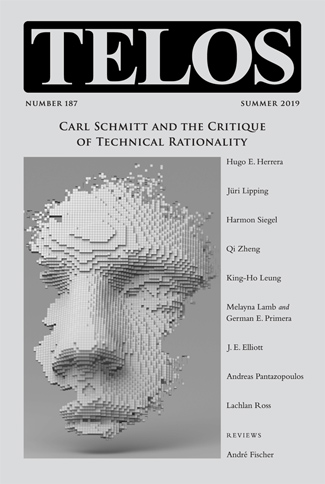In today’s episode of the Telos Press Podcast, David Pan talks with David A. Westbrook about his article “Social Capitalism: A Descriptive Sketch,” from Telos 194 (Spring 2021). An excerpt of the article appears here, and we are providing free open access to the full article at the Telos Online website. To learn how your university can subscribe to Telos, visit our library recommendation page. Print copies of Telos 194 are available for purchase in our online store.

The following interview appeared in the Welt am Sonntag. This translation is published here with permission. Wolfgang Reitzle is one of Germany’s leading business executives. Translated by Russell A. Berman, with comments here. Welt am Sonntag: Mr. Reitzle, the corona crisis robbed many Germans of their illusions about this republic. They don’t recognize their country anymore. They used to think of it as progressive, organized, digitalized, and well led. Was that image of modern Germany just a fantasy? Wolfgang Reitzle: There have been plenty of signs of a discrepancy in Germany between appearance and reality: despite a defense budget of 47 billion euros, our guns can’t shoot, our tanks can’t roll, and our airplanes can’t fly—this doesn’t seem to bother anyone here, but other countries have taken notice. Our inability to build an airport for our capital city astonished the world. Berlin, a “Failed State”? Bureaucracy, Ideology, and Global Competition—Comments on Wolfgang ReitzleWolfgang Reitzle is one of Germany’s premiere business executives, and Klaus Boldt, part of the editorial leadership of Die Welt, one of the foremost business journalists. The wide-ranging interview here points to the multiple dimensions of the problems facing Germany at the end of the Angela Merkel era. The general elections in late September are sure to lead to a new coalition government in Berlin—and a new chancellor—who will face all the problems that Reitzle diagnoses, with the possible exception of the pandemic, hopefully over by the fall, even in Europe. While the coronavirus’s economic, social, and political consequences are however sure to linger on, it figures here primarily as an example of massive government failure and the toxic mixture of bureaucracy, ideology, and incompetence that Reitzle denounces and that leads him to call Berlin “a failed state.” Those are harsh words from a prominent leader of the German business community, especially when one recalls how in the U.S. political discussion in recent years Germany has been repeatedly held up as the better alternative to the Trump administration. Not long ago the myth of Angela Merkel as the new leader of the free world circulated through the press. That once-glowing imagery has now vanished in the face of the catastrophes of the German and the EU corona response, and the prospect of continued slow economic growth, fraying infrastructure, and insufficient support for technological innovation in the country where one would least expect it. Reitzle helps us understand why. The following interview was conducted by Moritz Schwarz and appeared in Junge Freiheit, on August 14, 2020. Published with permission. Translated by Russell A. Berman, who has written a separate note here. Dr. Maaßen, the Mayor of Tübingen, Boris Palmer, has warned against a “world of prohibitions” in Germany, in which “moral condemnation” could follow the smallest mistake. This would “destroy liberal democracy.” Is he right? Hans-Georg Maaßen: I am a jurist, out of passion, and that’s why I am frightened to have to agree with him in part. I am deeply concerned that our legal state—the rule of law—is being more and more undermined by the rule of morality. Bärbel Bohley’s disappointed phrase is well known: “We wanted justice, but all we got is the rule of law.” Isn’t morality the better and ethically higher good? Maaßen: No. It is true that the law only provides a moral minimum. Yet that is precisely the precondition of freedom. The pandemic crisis has surfaced fundamental tensions between the scope of state power and commitments to democracy and dissent. Facing an emergency, the state must act vigorously, but liberal democracies are premised on understandings of basic rights, maximal freedom, and limited government, desiderata at odds with state power. This opposition has been playing out in different ways in the United States and in Europe, and in Europe nowhere more saliently than in Germany. A recent controversy in Germany provides insight into the process by which the need to respond to the pandemic acts as a vehicle to enhance state power in a way that threatens basic freedoms. This is the core conflict: the genuine urgency of developing public health measures to contain the pandemic can contribute simultaneously to the augmentation of state power. Questions of the vitality of democracy are at stake, and not only in Germany. Qi Zheng’s “Carl Schmitt, Justice of War, and Individual Citizen’s Obligation” appears in Telos 187 (Summer 2019). Read the full article at the Telos Online website, or purchase a print copy of the issue in our online store. Individual subscriptions to Telos are available in both print and online formats. This paper is divided into two sections. The first section reconstructs Schmitt’s arguments on an individual citizen’s right to resistance in international law. It focuses on two questions: whether an individual citizen has the right to judge the justice of war and whether individuals have an obligation in international law to disobey the government if they find that their government is conducting an unjust war. The second section examines Schmitt’s argument about the relationship between protection and obedience. |
||||
|
Telos Press Publishing · PO Box 811 · Candor, NY 13743 · Phone: 212-228-6479 Privacy Policy · Data Protection Copyright © 2025 Telos Press Publishing · All Rights Reserved |
||||



